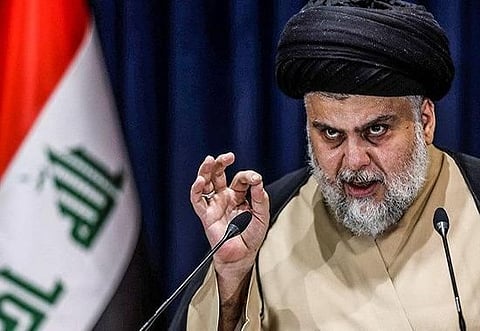

An announcement coming from a major political figure in the form of cleric Muqtada al-Sadr’s decision to quit politics fueled an already prevailing 15 months longs political tensions in the capital city of Baghdad where violence broke out soon after the announcement.
The unstable country owing to a heavy terrorist deployment from the IS is heading towards a grave political cum civil crisis amid a nationwide curfew as an internal militia conflict in Baghdad’s Green Zone killed 15 plus people.
The shooting took place after the powerful Shia cleric Muqtada al-Sadr announced his retirement from politics apart from his spiritual mentor’s decision to retire and make an attempt to persuade Sadr to shift his loyalty towards Iran.
Sadr’s supporters, who had been staging a weeks-long sit-in at the parliament Green Zone, broke through the entrance to the Republican Palace, where the cabinet usually meets.
After announcing his political call Sadr’s supporters took over the street and started vandalizing public properties besides burning the Iranian-backed Shia leader’s posters including slain military General Qaassem Suleimani, who was killed in a US drone strike in 2020.
The recent development in Iraq is the result of 10 months long political stalemate and a bitter struggle for influence between Iranian-backed interests and pro-Baghdad parties.
The Iraqi crisis was propelled post the resignation of Ayatollah Kadhim al-Haeri which prompted many observers of the current political situation that Iraq’s fate will be made in Shia Islam’s two prominent center’s Najaf in Iraq and Qom in Iran in place of the country’s sovereign capital.
As the night went by the sporadic struggle erupted between the Iranian-backed militia and the Sadr loyal forces in Baghdad who holds the power of commanding the Army.
The major turmoil in the Iraqi crisis was observed in July when Sadr’s supporters occupied the Parliament demanding a wholesale change to the political settlement of Iraq.
Sadr had been among the major beneficiary of the post-2003 political system established during the US occupation. The cleric leader made the best out of it to establish dominance over his followers and influence the masses for his political well-being.
The popularity he received was reflected in the elections as well when he secured the maximum number of seats in the October general elections, however, asked his members to resign after failing to establish the government in the country.
Haeri and Sadr’s political face-off is nothing new to be heard of. Haeri has now and then challenged Sadr’s right to act. Haeri has even gone on to say, “You can’t lead them by names. In reality, even if you come from a Sadrist family, you are not a Sadrist.”
The statement shook entire Iraq and the region, which had been continuously bracing up for a clash between the Shia group.
Some international observers of the current Iraqi crisis that the prolonged clash will put the Iraqi military have a large number of Sadr supporters to the test.
Meanwhile, UN Chief Antonio Guterres issued a statement calling out the warring factions and other parties to come to a joint consensus and take immediate action to stop the tensions to grow.